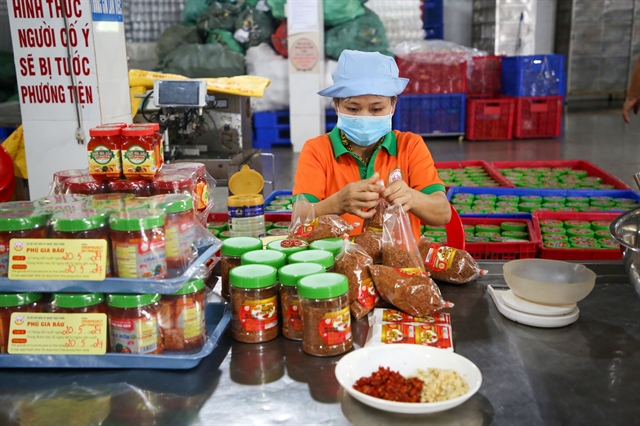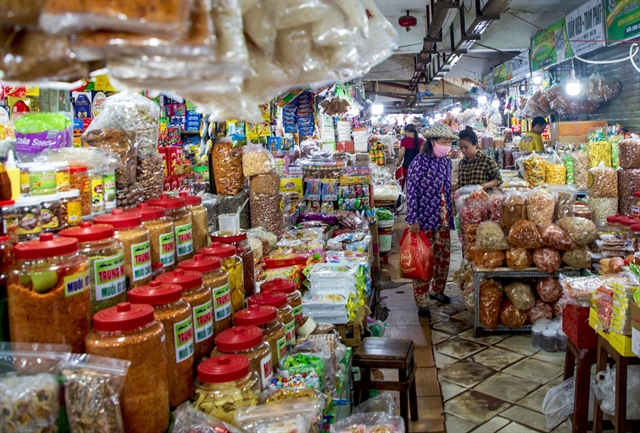 Society
Society

 |
| Red chilli salt made by Phú Gia Bảo Food Industries Processing Establishment in Tây Ninh Province’s Gò Dầu District has been recognised as a three-star product under the national “One Commune – One Product” (OCOP) programme. – VNA/VNS Photo Giang Phương |
TÂY NINH – Tây Ninh Province has taken a number of measures to sustainably develop products recognised under the national “One Commune - One Product” (OCOP) programme.
Since it started implementing the programme in 2018, the southeastern province has added 92 OCOP products rated three stars or above.
Situated in the southeastern key economic zone and with mild weather, Tây Ninh has many products such as shrimp salt, custard apple and cassava that can be developed into OCOP products.
Đặng Khánh Duy, general director of Tân Nhiên Company Limited in Hoà Thành Town’s Trường Đông Commune, said Tây Ninh is one of the country’s largest cassava producers and also has many cassava starch producing plants.
He had researched and produced super-thin rice paper from cassava starch so that consumers did not need to dip it in water to soften it to make fresh spring rolls, he said.
His company’s super-thin rice paper was the province’s first five-star OCOP product, the programme’s highest rating, and is exported to many overseas markets, including South Korea, the US, Australia and Japan, he said.
Recognition as OCOP products has helped many producers increase sales.
They include Vương Ngọc Vegan custard apple wine, Vĩnh Xuân custard apple juice, Hoàng Xuân honeydew melon, and Vạn Linh Hương incense, all with four stars, which have expanded their sales nationwide.
Many OCOP producers have invested in modern facilities to improve quality and their products’ competitiveness.
Đoàn Thị Kim Quyên, owner of Phú Gia Bảo Food Industries Processing Establishment in Gò Dầu District, said her business has three three-star products - taro fermented bean curd, black pepper salt and red chilli salt.
She invests in modern production facilities to improve quality and meet market requirements, she said.
Nguyễn Thanh Hải, deputy chairman of the Gò Dầu District People’s Committee, said: “[We] will ask relevant agencies to help producers improve quality, packaging and labelling of their OCOP products.”
His administration would help producers build a showroom for their OCOP products and also introduce and sell their products at other OCOP product showrooms, he added.
The OCOP programme and building new-style rural areas have created jobs for rural people, boosted sales of local products and introduced the culture and identity of rural areas to consumers across the country.
Nguyễn Đình Xuân, director of the province Department of Agriculture and Rural Development, said: “The province … aims to develop certain products in certain areas.”
For instance, Trảng Bàng Town would produce rice paper and red chilli salt and Bà Đen Mountain area in Tây Ninh City would grow custard apple, he said.
The province plans to develop 22 high-tech agricultural zones, including 11 that cultivate only certain products such as rice, custard apple, durian, and jackfruit, and develop them into OCOP products.
It will develop a 200ha high-tech rice growing zone in Trảng Bàng Town’s Phước Bình and Phước Chi communes and a 200ha zone in Châu Thành District’s Thanh Điền Commune.
It will develop high-tech speciality fruit growing zones in Tân Châu, Gò Dầu, Tân Biên, and Dương Minh Châu districts.
Developments
 |
| Tây Ninh Province’s speciality products such as red chilli salt, shrimp salt, taro fermented bean curd, and rice paper sold at a local market. The province has many speciality products recognised under the national “One Commune – One Product” (OCOP) programme. – VNA/VNS Photo Giang Phương |
Tây Ninh aims to have 100 - 120 OCOP products by 2025, and maintain or improve the ratings of at least half of existing ones.
It will prioritise development of these products and their brand names together with rural tourism.
It aims to ensure at least 50 OCOP producers sell through modern distribution channels such as supermarkets, convenience stores and e-commerce platforms.
Xuân, director of the province Department of Agriculture and Rural Development, said: “The province has ample room for developing of OCOP items.”
To ensure farmers benefit, it has various policies to develop linkages between stakeholders in speciality agricultural products to increase their quality, value and brand names, he said.
The department would help producers understand the importance of product quality and expand markets, he said.
It would increase advocacy activities for recognition as OCOP products, he said.
It would collaborate with other agencies to foster trade promotion, bring together buyers and sellers and sell OCOP products at popular tourism destinations, he said.
The province plans to invest VNĐ140 billion (US$5.7 million) to implement the programme in 2020-25.
It is implementing policies to assist co-operatives, co-operative groups, small- and medium-sized companies, farms, and households develop OCOP products.
They are offered financial support to rent or build showrooms for their OCOP products and develop brand names, packages and labels for them.
Those building showrooms will get half the cost as subsidy. – VNS




